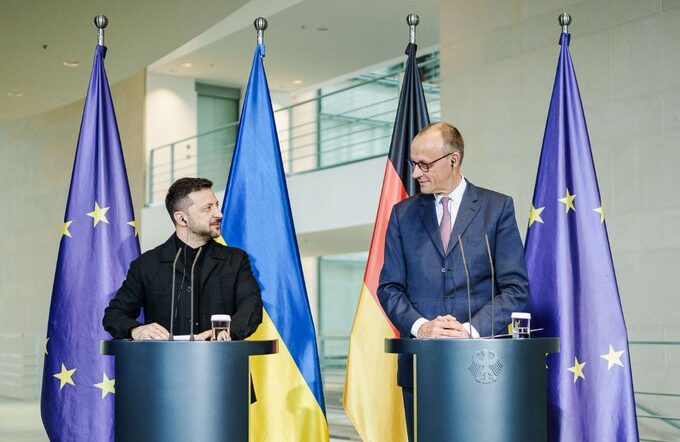German Chancellor Friedrich Merz has pledged to assist Ukraine in the production of long-range missiles, marking a significant escalation in Berlin’s support for Kyiv amid Russia’s ongoing invasion. The announcement came during Ukrainian President Volodymyr Zelensky’s visit to Berlin on May 28, 2025, as both leaders sought to project unity and resolve in the face of escalating Russian aggression.
A Shift in German Policy and Western Solidarity
Merz’s commitment to help Ukraine manufacture long-range missiles follows his recent declaration that Germany, alongside its Western allies, has lifted all restrictions on the range of weapons supplied to Ukraine. “There are no longer any range restrictions on weapons supplied by Kyiv’s Western allies,” Merz stated, echoing a policy shift that was actually agreed upon months earlier but only recently made public. This move allows Ukraine to target Russian military installations well beyond its borders, a capability that Moscow has repeatedly warned against, calling it a “dangerous” escalation.
The practical implications of this policy are profound. Previously, Western-supplied long-range missiles—such as the British and French Storm Shadow/SCALP missiles and the American ATACMS—were limited in their use by Ukraine, often restricted to strikes within occupied Ukrainian territory. Since late 2024, however, these restrictions have been relaxed, permitting Ukraine to strike Russian military targets inside Russia itself.
The Taurus Missile Controversy
Of particular interest is Germany’s Taurus cruise missile, which boasts a range of 500 kilometers (about 310 miles) and is considered more precise than other systems currently in Ukraine’s arsenal. While Merz has not explicitly promised to deliver Taurus missiles to Ukraine, his remarks and the new memorandum of understanding signed between the German and Ukrainian defense ministries suggest a willingness to enhance Ukraine’s long-range strike capabilities. The previous German government, led by Olaf Scholz, had refused to provide Taurus missiles, citing fears of provoking nuclear-armed Russia.
Merz’s current stance has drawn criticism from within his own party, with some senior conservatives accusing him of making “contradictory statements” regarding the delivery of long-range weapons. Meanwhile, Russia’s Foreign Minister Sergei Lavrov has chided Merz for his remarks, interpreting them as a sign that Western leaders had already secretly agreed to allow long-range strikes into Russia.
Strategic Ambiguity and the Future of German Support
The German government has also adopted a policy of strategic ambiguity regarding the types of weapons it supplies to Ukraine. Since taking office, Merz has ended the public listing of most military aid details, a move that could mask the potential transfer of sensitive systems like the Taurus missile. This shift is partly driven by domestic political pressures and the need to balance coalition dynamics, especially with the Social Democrats (SPD), who remain cautious about escalating the conflict.
Economic and Political Considerations
Germany’s support for Ukraine remains robust but is not without its challenges. The country has already provided the second-largest amount of military aid to Ukraine after the United States, but its capacity to supply weapons from its own stockpiles is reportedly nearing its limit. Additionally, the 2025 draft budget allocates only half the amount for Ukraine support compared to 2024, reflecting growing fiscal pressures.
Despite these constraints, Merz has reaffirmed his commitment to Ukraine’s defense. During his meeting with Zelensky, he emphasized that Germany would help Kyiv produce long-range missiles, though he remained vague on the specifics, stating, “We want to discuss production, and we will not publicly go into specifics”. The memorandum signed by the two defense ministers is expected to formalize this cooperation, potentially paving the way for joint production or technology transfer agreements.
International Reactions and Implications
The Kremlin has reacted strongly to Merz’s announcements, warning that any move to eliminate range restrictions or supply Taurus missiles would be a dangerous escalation and could jeopardize efforts to reach a political settlement. However, Merz and other Western leaders argue that enabling Ukraine to strike legitimate military targets inside Russia is necessary for its self-defense, especially in light of recent large-scale Russian attacks, including a record 355-drone assault over a single weekend.
Conclusion
Friedrich Merz’s promise to help Ukraine produce long-range missiles signals a new chapter in German-Ukrainian defense cooperation. While the details remain shrouded in strategic ambiguity, the move represents a clear shift toward greater Western support for Ukraine’s ability to defend itself against Russian aggression. The decision to lift range restrictions and support domestic missile production in Ukraine could have far-reaching consequences for the conflict, the balance of power in Europe, and the prospects for peace in the region.

